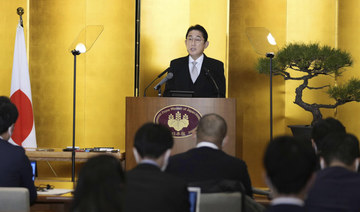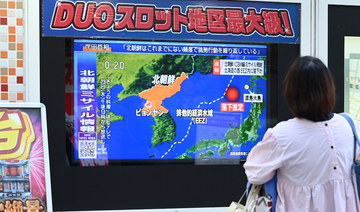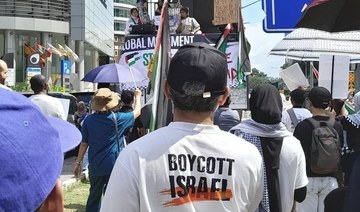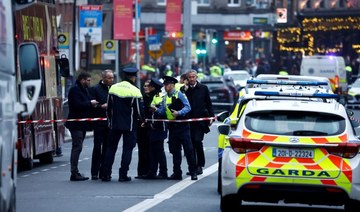WASHINGTON: The top national security officials from the US and Japan unveiled plans Wednesday to strengthen the alliance to help counter threats from North Korea and China, which they called the greatest challenge in the region.
Secretary of State Antony Blinken said the agreement reflects the two nations’ effort to deepen cooperation “across all realms,” including space, cybersecurity and emerging technologies.
“It is hard to overstate the importance of the US-Japan alliance for more than seven decades,” said Blinken, following the meeting at the State Department. “It’s been the cornerstone of peace and stability in the Indo-Pacific, ensuring the security, the liberty and prosperity of our people and people across the region.”
The two nations are revising their joint defense posture and planning increased military exercises as they confront rising threats from North Korea and increasing aggressiveness from China.
The US and Japanese foreign and defense ministers agreed to adjust the American troop presence on the island of Okinawa. Prior to the meeting, Japan’s defense ministry announced it was ready to start construction on an uninhabited island where the two militaries will hold joint military exercises.
Wednesday’s discussions will be followed by a meeting on Friday between President Joe Biden and Japanese Prime Minister Fumio Kishida at which they will underscore the importance of the relationship.
Kishida, on a weeklong trip to visit allies in Europe and North America, signed a defense agreement with British Prime Minister Rishi Sunak on Wednesday that strengthens military ties between their two counties, also in response to China’s increasing military assertiveness.
Following their talks, Blinken, Defense Secretary Lloyd Austin and their Japanese counterparts, Yoshimasa Hayashi and Yasukazu Hamada, planned to issue a joint statement that will adjust, but not increase, the American troop presence on Okinawa.
Speaking to reporters after the meeting, all four condemned China’s increasing aggression in the region and said the agreement will provide a strong path to counter that.
Austin noted that the agreement affirms America’s “ironclad commitment to defend Japan with a full range of capabilities, including nuclear” and underscores that Article 5 of the mutual security treaty applies to the Senkaku Islands. The disputed islands outside Japanese territorial waters are also claimed by Beijing.
The statement also adds a formal mention of space in the longstanding security treaty, making clear that “attacks to, from and within space” could trigger the mutual defense provisions of the treaty, according to an administration fact sheet. That had previously been outside the scope of the agreement.
Earlier Wednesday, Japan said it would soon begin constructing a pair of runways on the small southern island of Mageshima where the two militaries are to conduct joint exercises, including those of F-35B stealth fighters, amphibious operations and missile interception beginning around 2027.
The construction could start as early as Thursday, it said. The island, off the southwestern coast of Kagoshima on the southernmost main island of Kyushu, will be a hub for troop deployment and munition supply in case of a conflict like a Taiwan emergency.
Japan and the United States are moving one of their key flight exercise sites to the southern island, which is much closer to the US air base of Iwakuni, home to an F-35B fleet, than the current training site on Iwo Jima, where one of the bloodiest and most iconic battles of World War II was fought.
The changes in the deployment on Okinawa will transform the 12th Marine Regiment into a smaller, more rapidly mobile unit — the 12th Marine Littoral Regiment, which will be designed to be better equipped to fight an adversary and defend the US and its allies in the region, US officials said.
Austin said the regiment will bring “tremendous” capabilities to the region as a “more lethal, more agile, more capable” military unit.
The officials said the decision will not increase the number of Marines on the island and does not come with any significant change in weapons capability.
Reinforcement of military capability or troops is a sensitive issue for Okinawa, site of one of the bloodiest ground battles at the end of World War II. The island hosts more than half of the US troops based in Japan, and Okinawans want that number reduced.
A senior administration official, who requested anonymity to discuss negotiations with the Japanese, said historically negotiations involving US force posture in Okinawa have been “unbelievably fraught, incredibly challenging and difficult” and often took years to complete. But negotiations before Wednesday’s meeting were completed with striking speed, the official said.
The agreements follow Japan’s announcement last year that it would increase its defense spending to 2 percent of gross domestic product over five years. That would make its defense budget the world’s third-largest — a dramatic shift in Tokyo’s priorities that reflects growing concerns about North Korea and potential Chinese military action against Taiwan.
While there is a growing fear of a Taiwan emergency, many islands in the region are concerned that a defense buildup could increase the risks of getting embroiled in war.
The change in Okinawa is part of a broader shift being made across the Marine Corps to make the service better able to operate in contested areas, particularly within striking range of an enemy. That element is critical in the Indo-Pacific, where thousands of US and allied forces are easily within missile — or even rocket — range of both China and North Korea.
One Marine littoral regiment has already been set up in Hawaii, the second would be in Okinawa..
Details are still being worked out, but a littoral regiment is made up of roughly 2,000 Marines, and includes a combat team with an anti-ship missile battery, a logistics battalion and an air defense battalion. The current Marine regiment on Okinawa that it would essentially replace includes about 3,400 Marines and sailors. The overall number of Marines on Okinawa would remain about the same, officials said.
In their talks on Friday, Biden is expected to raise with Kishida the case of Lt. Ridge Alkonis, a US Navy officer deployed to Japan who has been jailed after pleading guilty last year to the negligent driving deaths of two Japanese citizens in May 2021, according to the senior administration official.
Alkonis’ family says he suddenly fell unconscious behind the wheel during a family trip on Mt. Fuji. He was so out of it, they say, that neither his daughter’s screams to wake up nor the impact of the collision roused him.
Alkonis’ car veered into parked cars and pedestrians in a parking lot, striking an elderly woman and her son-in-law, both of whom later died. Alkonis was sentenced to three years in prison in October, a sentence that the family and US lawmakers have called unduly harsh considering the circumstances. Alkonis also agreed to pay the victims’ $1.65 million in restitution.
The official said the administration was working “to find a compassionate resolution that’s consistent with the rule of law.”
US, Japan unveil plans to strengthen the alliance
https://arab.news/bzuaj
US, Japan unveil plans to strengthen the alliance
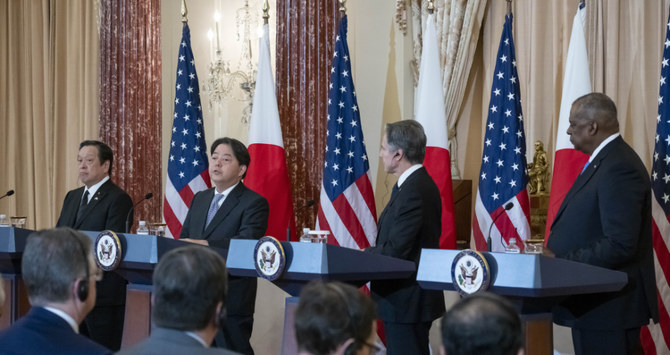
UK opposition suffers major Muslim vote losses in local elections

- Shadow home secretary: ‘Many people feel really strongly’ about Gaza ‘and rightly’
- Labour MP: ‘It’s not just Muslims. On our doorknocks, we’ve had a lot of middle-class white voters raise it as well’
LONDON: A series of local election victories by the UK’s opposition Labour Party has been overshadowed by a major fall in support among Muslim voters, leading to concern within the party ahead of a general election later this year.
After local elections were held across the country on Thursday, Labour suffered key losses in areas with high Muslim populations due to controversies over the party’s stance on the Gaza war.
Labour must do some “searching” in response to “questions” over its performance, one MP said.
The potential loss of Labour candidate Richard Parker in the West Midlands mayoralty election led to a racism row after an unnamed party source blamed “the Middle East” on deciding the race.
In total, the party gained more than 140 council seats during the elections, The Guardian reported.
But those gains are overshadowed by the potential West Midlands defeat and the Conservative candidate for mayor of London, Susan Hall, running a closer race against incumbent Sadiq Khan than previously expected.
Labour have “trouble brewing on their left flank” after focusing on traditionally rural and whiter areas, said Rob Ford, a politics professor at the University of Manchester.
“There has been a substantial loss of support in heavily Muslim areas and they are going backwards a bit in progressive areas and areas with students. It is progress at a price,” he added.
By offsetting urban losses with gains among rural voters, Labour would win about 34 percent of votes at a general election compared to 25 percent for the Conservatives, the BBC reported.
Yet fear of bleeding urban voters, including Muslims, is driving anxiety in the party ahead of the general election, sources told The Guardian.
“The polls (which predicted a 20-point lead for Khan) were completely wrong, this is going to be much closer than expected,” one source said.
A source in Birmingham, where independent candidate Akhmed Yakoob stood as a spoiler to Labour, said: “Yakoob is picking up over 50 percent in some inner-city wards, so the Gaza impact may be bigger than first estimated.”
Labour also suffered a shock loss in Oldham, losing control of the council after a number of seats were taken by pro-Palestinian independent candidates.
In Manchester, the party lost its deputy leader to a candidate from MP George Galloway’s Workers Party of Britain.
Jess Phillips, Labour MP for Birmingham Yardley, told the “Electoral Dysfunction” podcast in the wake of the vote that the party will have to “wake up and face” the issues that led to losses against independent and Workers Party of Britain candidates.
“I very much expect, as the mayoral votes come in, that in places like Birmingham, Bradford, places with high Muslim populations, as we’ve seen overnight in Oldham, that the Labour Party will have some questions that they have, and some searching to do themselves,” she added, according to Sky News.
Areas with a proportion of Muslim voters higher than 20 percent recorded average losses of 17.9 points for Labour.
The comments by a party source concerning the West Midlands race have led to a post-election race row.
“It’s the Middle East, not West Midlands that will have won (Conservative Mayor Andy) Street the mayoralty. Once again Hamas are the real villains,” the Labour source reportedly told the BBC.
The remarks were condemned by figures including Labour MP Bell Ribeiro-Addy, the Daily Telegraph reported.
“This is a disgusting way to talk about Muslim voters, conflating them with Hamas and treating them as a monolith,” she said. “It reeks of racism and entitlement. Such comments should have no place in the Labour Party.”
According to The Times, MP Zarah Sultana said: “Once again, I’m deeply disturbed by Islamophobic quotes given to the media by ‘Labour sources.’
"When politicians are confronted with racist bile, it should be immediately condemned. As a party we need to listen to and acknowledge concerns, not hold British Muslims in contempt.”
Yvette Cooper, Labour’s shadow home secretary, conceded that the party’s stance on a Gaza ceasefire was “partly” a factor in the surprise defeats.
“Many people feel really strongly about this — and rightly, because tens of thousands of people have been killed, including the majority of them women and children,” she said.
Muslim vote organizers hailed the success of the elections in sending a message to Labour leader Keir Starmer.
Party sources warned that Labour must work overtime to regain the trust of Muslim voters ahead of a general election expected later this year.
“People use local elections to send the government — and sometimes the opposition — a message,” a senior Labour source told The Times.
“The damage is done and even though our position is much better now, if Israel pushes into Rafah people will say we didn’t do enough to urge restraint right at the start.”
A Labour MP added: “It’s terminal with a lot of people, and it’s not just Muslims. On our doorknocks, we’ve had a lot of middle-class white voters raise it as well.”
KFC stores in Malaysia shutter amid anti-Israel boycott

- KFC is not on Malaysian boycott movement’s list, but consumers see it as linked to Israel
- Franchise operator cites ‘challenging economic conditions’ as reason for closures
KUALA LUMPUR: Scores of KFC outlets have closed in Malaysia amid calls to boycott the chain and other brands accused of links with Israel.
Since the outbreak of Israel’s deadly attacks on Gaza in October, many Malaysian citizens have backed a growing refusal to buy products from the Western companies seen as having relations with Tel Aviv.
KFC is among a number of brands that have been reeling from falling revenues, as those who join the boycott movement see them facilitating the Israeli strikes, which have already killed nearly 35,000 people in the Palestinian territory, mostly women and children.
The US-origin fast-food chain has closed more than 100 outlets across Malaysia since October, according to local media estimates.
KFC Malaysia operator QSR Brands Holdings admitted in a statement earlier this week to a temporary closure to “manage increasing business costs,” which it attributed to “challenging economic conditions.”
QSR Brands did not say how many outlets had been closed or if the action was due to a loss in sales caused by the boycott.
The company, which runs over 600 KFC restaurants across the Southeast Asian nation, said staff from affected outlets were given the opportunity to “relocate to busier” stores.
Major companies with international brand names in Malaysia have in recent months reported losses due to the boycott, even if they were not original targets of the action.
In February, the parent company of the US-origin coffee chain Starbucks in Malaysia said the snub by customers led to a near 40 percent drop in revenue. The news followed an earlier claimed loss of profits and job cuts by the country’s McDonald’s franchise.
The anti-Israel boycott in Malaysia has been spearheaded by the local chapter of the global Boycott, Divestment, Sanctions movement. Besides McDonald’s, other popular brands it listed included Burger King, Puma, Airbnb and Pizza Hut.
BDS Malaysia Chairman Mohd. Nazari Ismail told Arab News that KFC was not on the group’s boycott list, but it might be targeted because of its US origins.
“Many Malaysians perceive any American fast-food operator to be related to Israel including KFC,” he said.
“KFC is not on our list because BDS’s strategy is to focus on a limited number of companies to maximize the impact of our efforts. But it is on the list of other organizations that call for boycott of all companies that are related to Israel.”
Many Malaysians who reacted on social media to the news of the outlets closing commented “alhamdulillah,” or “thank God,” with some singling out KFC’s parent company in the US, the American fast-food multinational Yum Brands.
“KFC’s parent company, Yum Brands, invests in Israeli startups,” said X.com user meraungkesepian.
Others targeted the chain’s quality, saying it had fallen off the mark, leading to their shunning of the brand.
“Many have boycotted KFC not 100 percent because of Israel. But because KFC doesn’t have any quality,” said X.com user tonnychua9988 in Malay.
The boycott of KFC was expected, according to Syaza Farhana Mohamad Shukri, associate professor of political science at the International Islamic University Malaysia.
“I think the KFC boycott was inevitable because what is more American than Kentucky Fried Chicken?” she said.
“It is all based on sentiment ... companies that appear to be American-based get the brunt of the people’s anger.”
More than 60 percent of Malaysia’s 33 million people are Muslim, and the country has been fiercely supportive of the Palestinian struggle for decades.
It has no formal relations with Israel and bars Israeli nationals from entering its territory.
In December, Malaysia also barred Israeli and Israel-bound ships from docking at its ports.
Hectoliters of purple ink mark voters in India’s colossal poll

- Ink started to be used in 1962, during India’s 3rd general election
- 2.65m vials of ink produced for the 2024 parliamentary vote
NEW DELHI: Every election in India leaves a mark on its people, not only in political terms, but also literally, in the form of purple stains on their index fingers.
As voters register in booths and have their ID verified to cast ballots, election officers paint a streak of ink across the top of their left index finger, leaving a dark purple stain that usually stays on the skin for more than two weeks.
The exercise started in 1962, during India’s third general election, to prevent fraud and duplicate votes, after the country’s first two polls were marred by complaints of voter impersonation.
One manufacturer was chosen to supply the ink and, as the country’s 18th parliamentary vote is underway, it is still the same one: Mysore Paints and Varnish, from Mysore city in the southern state of Karnataka.
The company was founded in 1937 by the then ruler of Mysore, Maharaja Krishnaraja Wadiyar IV, and became a public sector company after India gained independence from British rule in 1947.
Operated by the Karnataka state government, it is the only company authorized to produce the voter ink.
“From 1962, we have been the exclusive supplier of ink to the election commission of India,” K. Mohammed Irfan, the company’s managing director, told Arab News.
“At that time, Sukumar Sen was the chief election commissioner, and the inventor of the ink is by the name of Dr. Mathur.”
The inventor worked at the National Physical Laboratory, one of India’s earliest national laboratories, and the manufacturing process is based on a guarded chemical formula that has never changed.
“This ink cannot be erased easily,” Irfan said. “It is made of silver nitrate. Once the ink comes into the light it forms bluish and brownish stains, which remain from three days to more than one month.”
More than 968 million people are registered to vote in the world’s biggest election, which started on April 19 and will run in six phases until June 1. The Election Commission has ordered hectoliters of the indelible ink as part of the process.
“For this parliamentary election, we have taken around 80 days to manufacture 2.65 million bottles of ink,” Irfan said, adding that each vial is 10 ml.
“The total cost of manufacturing is 55 crore rupees ($6.6 million).”

Inked fingers are flashed by all those who cast their vote — from Bollywood stars and politicians to common citizens who take pride in being part of elections, which the Indian government usually refer to as “the festival of democracy.”
Shashank Aggarwal, 19, a first-time voter from Noida city, went to the polls on April 26 in the second phase of the vote.
“When the ink got marked on the finger, I felt that I had become part of the festival,” he said. “It felt nice.”
Kapil Sharma, who also voted last week, said that the purple pigment was still clear on his skin.
“The mark is still fresh and has not disappeared,” he said. “I proudly display my inked finger. I don’t mind if it sticks with me for the next five years. It’s a symbol and color of our democracy.”
Pakistan records ‘wettest April’ in more than 60 years: weather agency
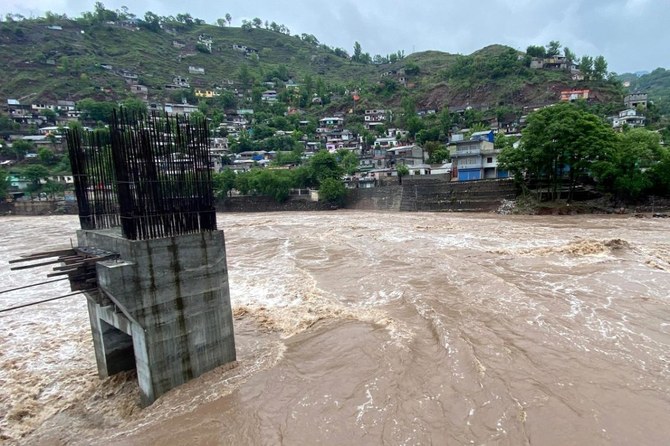
- Pakistan received more than twice as much rain as usual for the month
- Pakistan is increasingly vulnerable to unpredictable weather, as well as often destructive monsoon rains that usually arrive in July
ISLAMABAD: Pakistan experienced its “wettest April since 1961,” receiving more than twice as much rain as usual for the month, the country’s weather agency said in a report.
April rainfall was recorded at 59.3 millimeters, “excessively above” the normal average of 22.5 millimeters, Pakistan’s metrology department said late Friday in its monthly climate report.
There were at least 144 deaths in thunderstorms and house collapses due to heavy rains in what the report said was the “wettest April since 1961.”
Pakistan is increasingly vulnerable to unpredictable weather, as well as often destructive monsoon rains that usually arrive in July.
In the summer of 2022, a third of Pakistan was submerged by unprecedented monsoon rains that displaced millions of people and cost the country $30 billion in damage and economic losses, according to a World Bank estimate.
“Climate change is a major factor that is influencing the erratic weather patterns in our region,” Zaheer Ahmad Babar, spokesperson for the Pakistan Meteorological Department, said while commenting on the report.
While much of Asia is sweltering dure to heat waves, Pakistan’s national monthly temperature for April was 23.67 degrees Celsius (74 degrees Fahrenheit) 0.87 degrees lower than the average of 24.54, the report noted.
Students erect pro-Palestinian camp at Ireland’s Trinity College
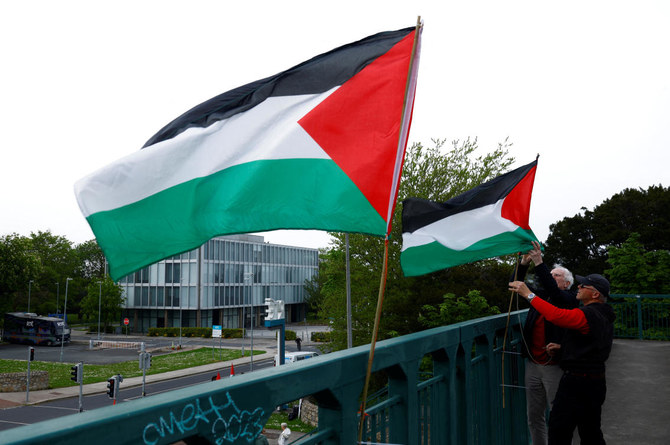
DUBLIN: Students at Trinity College Dublin protesting Israel’s war in Gaza have built an encampment that forced the university to restrict campus access on Saturday and close the Book of Kells exhibition, one of Ireland’s top tourist attractions.
The camp was set up late on Friday after Trinity College’s students’ union said it had been fined 214,000 euros ($230,000) by the university for financial losses incurred due to protests in recent months not exclusively regarding the war in Gaza.
Students’ union President Laszlo Molnarfia posted a photograph of benches piled up in front of the entrance to the building where the Book of Kells is housed on the X social media platform on Friday. The illuminated manuscript book was created by Celtic monks in about 800 A.D..
“The Book of Kells is now closed indefinitely,” he said in the post.
Trinity College said it had restricted access to the campus to students, staff and residents to ensure safety and that the Book of Kells exhibition would be closed on Saturday.
Similar to the student occupations sweeping US campuses, protesters at Trinity College are demanding that Ireland’s oldest university cut ties with Israeli universities and divest from companies with ties to Israel.
Protests at universities elsewhere have included Australia and Canada.
In a statement last week, the head of the university, Linda Doyle, said Trinity College’s was reviewing its investments in a portfolio of companies and that decisions on whether to work with Israeli institutions rested with individual academics.
More than
34,600 Palestinians
have been killed in Israel’s seven-month-old assault on the Gaza Strip, say health officials in the Hamas-ruled enclave. The war began when Hamas militants attacked Israel on Oct. 7, killing 1,200 people and abducting 253 others, of whom 133 are believed to remain in captivity in Gaza, according to Israeli tallies.
Ireland has long been a champion of Palestinian rights, and the government has pledged to formally recognize Palestine as a state soon.
($1 = 0.9295 euros)



